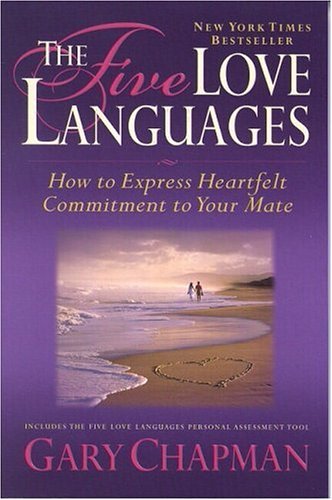Love Languages Part 1: Two Types of Love and The Love Tank
 A few years ago, my circle of friends turned me onto a book called The Five Love Languages by Gary Chapman. It's an interesting and practical view on how we express love to one another. He's got a simple and conversational style and, despite mixing of metaphors, it is a fantastic read. He offers a very simple perspective on why love tends to fade over time and offers practical ways that you can maintain or rekindle love between people (focused on couples and spouses). I was given the basic gist of the book from my friends and it all made sense. However, it wasn't until I sat down and read it that it really hit me and I was able to look back over previous and current relationships and see these principles in action. I'm a logical guy. I've been an engineer for many years. I'm a solution guy. Self-help stuff is all well and good, but if it's not practical then I don't have a lot of use for it. That's one of the reasons I liked this book so much. It's very practical and manageable! Love is complicated. No surprise there:
A few years ago, my circle of friends turned me onto a book called The Five Love Languages by Gary Chapman. It's an interesting and practical view on how we express love to one another. He's got a simple and conversational style and, despite mixing of metaphors, it is a fantastic read. He offers a very simple perspective on why love tends to fade over time and offers practical ways that you can maintain or rekindle love between people (focused on couples and spouses). I was given the basic gist of the book from my friends and it all made sense. However, it wasn't until I sat down and read it that it really hit me and I was able to look back over previous and current relationships and see these principles in action. I'm a logical guy. I've been an engineer for many years. I'm a solution guy. Self-help stuff is all well and good, but if it's not practical then I don't have a lot of use for it. That's one of the reasons I liked this book so much. It's very practical and manageable! Love is complicated. No surprise there:
A man is involved in an adulterous relationship, and he calls it love. The preacher, on the other hand, calls it sin. The wife of an alcoholic picks up the pieces after her husband's latest episode. She calls it love, but the psychologist calls it codependency. The parent indulges all the child's wishes, calling it love. The family therapist would call it irresponsible parenting. What is loving behavior? (pg. 20)
The first thing to understand is the difference between "in love" and "love." The "in love" experience is that Honeymoon phase that we talk about all the time. Where your partner can do no wrong and all of the little annoying things seem cute.
At its peak, the "in love" experience is euphoric. We are emotionally obsessed with each other. We go to sleep thinking of one another. When we rise that person is the first thought on our minds. We long to be together. Spending time together is like playing in the anteroom of heaven. When we hold hands, it seems as if our blood flows together. We could kiss forever if we didn't have to go to school or work.(pg 29)
This is the chemistry that we always talk about. That pheromone reaction that causes our brain to become intoxicated. It is similar to "love at first sight" which is irrational and based entirely on fantasy. The transition from this initial "in love" into the long lasting "love" is where things usually fall apart. This is where he borrows an idea from another psychologist and introduces the first and greatest of his mix-y metaphors:
The Love Tank
When your Love Tank is full, you feel loved. It's that simple. You are happy and therefore you have more patience and understanding when problems arise, etc. During the "in love" time your Tank is always full because you're riding high on the fantasy of the whole situation. After the transition, the fantasy fades away and we're living a real experience. We continue to use our love fuel, but unless our partner is refilling the tank we slowly find ourselves empty. That's when the fighting starts and the distance grows. He proposes that the Five Love Languages are the way we fill the Love Tank and I wholeheartedly agree! I'm going to periodically post another entry and talk about each language in turn. I hope you enjoy these posts and I hope you go and get this book!
